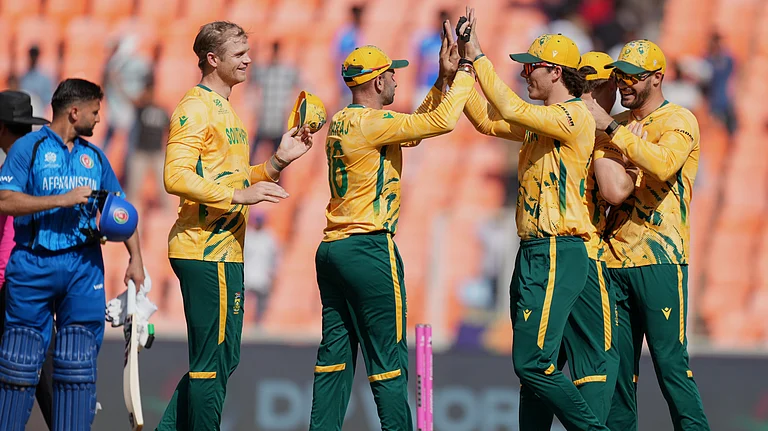When B.R. Ambedkar, chairman of the drafting committee, gave his final speech in the Constituent Assembly on November 25, 1949, he countered criticism that by giving the Centre powers to override the states, the Constitution makes India an over-centralised nation-state. Stating that the “use and operation” of such powers “are confined to emergencies only”, Ambedkar asked: “Could we avoid giving overriding powers to the Centre when an emergency has arisen?” Now that the country is grappling with a health emergency of unfathomable proportions and many state governments are left to fend themselves, the question Ambedkar posed in the Constitution’s defence assumes salience yet again. It brings forth the vexed issue of federalism and Centre-state relations at a time when the Centre’s disappointing response to the pandemic is forcing chief ministers of non-BJP-ruled states to speak out.
ALSO READ: Twice Orphaned
Last week, Jharkhand CM Hemant Soren took to Twitter to vent his displeasure soon after a Zoom meeting with PM Narendra Modi on the Covid situation in the state. “The PM only spoke his ‘mann ki baat’. It would have been better if he talked about ‘kaam ki baat’ and listened to ‘kaam ki baat’,” tweeted Soren, inviting fierce criticism from many Union ministers. “Cooperative federalism was given mere lip service during the past seven years, as something that is preached rather than practised,” Soren tells Outlook. “Throughout both phases of the pandemic, the Centre has not met our government’s expectations in providing critical support to tackle the crisis. Particularly during the second phase, despite writing to the Centre multiple times on provisioning of vaccines under the central government quota or permission to import Remdesivir or receiving optimal foreign aid, the Centre has ignored us.”
The Centre’s sudden shift in vaccine policy has left state governments in the lurch, say chief ministers of states not ruled by the BJP. The new policy allows state governments and private hospitals to buy vaccines directly from manufacturers. Earlier, negotiations with manufacturers and supply of vaccines to states were the Centre’s prerogative. Opposition leaders say the Centre has put the onus to procure vaccines on the states without even consulting them. The states were also caught by surprise when the Centre opened vaccination for everyone above 18 years.
ALSO READ: The Empire Of Cruelty
Lok Sabha MP and Congress leader Gaurav Gogoi says the government should have adopted a method of collective effort instead of an over-centralised approach focused on the optics. “Whether it’s about vaccination or distribution of oxygen, we see the Centre blaming the states, instead of taking them along. Right from day one, it has adopted a confrontational approach,” adds Gogoi.
TMC MP Mahua Moitra says the states were kept in the dark about the change in policies. “Initially, when we asked permission to procure vaccine, the Centre refused. Now they opened it up for the age group of 18-45 years. If you need 800 million doses and the vaccine production capacity is only up to 100 million, how are you opening up for above 18 years?” she asks.
Former Lok Sabha secretary general P.D.T. Achary says it’s the Centre’s responsibility to protect people from the pandemic and the buck cannot be passed to the states. “The onus is on the Centre, which has far more resources, to fix the price and supply vaccines to states on the basis of their population,” adds Achary.
ALSO READ: The Seventh Seal
When the first Modi government assumed office in 2014, it promised to abide by the spirit of cooperative federalism, in which states participate in the formulation and implementation of policies. “It failed to keep its promise,” says former Kerala finance minister Thomas Isaac. According to Issac, a vocal critic of the Modi government’s fiscal federalism, federalism is at a crossroads because of the breakdown in trust and coordination between the Centre and the states. “Undermining the states is the common denominator of most central legislation under the Modi regime—farm laws, scrapping of Article 370, changes in the NIA Act and the Unlawful Activities (Prevention) Act. This never happened before. Centralisation of power was done in a totally brazen manner,” says Isaac. For Achary, the unkindest blow was the Government of National Capital Territory of Delhi (Amendment) Act, 2021, which curtailed the Delhi government’s executive power. “Parliament has no power to do that. It was totally unconstitutional. Parliament has extended itself to areas not available to it. This will paralyse governance in Delhi,” he says.
ALSO READ: The Complete Covid Chargesheet
Opposition leaders point out that crucial legislation was passed and laws amended without consultation or consensus in the past seven years. The contentious ones include the new farm laws, the Citizenship (Amendment) Act, abrogation of Article 370, amendments to the NIA Act, UAPA, RTI Act, Land Acquisition Act and labour laws. “By abusing its political majority, the Modi government has turned cooperative federalism into a fancy slogan,” says Gogoi. “We have seen how a state was converted overnight into two Union territories (Jammu-Kashmir and Ladakh), and how a state government was stripped of its powers (Delhi). By doing this, they are trying to undermine the basic principle of federalism enshrined in our Constitution.”
Referring to the GST council, Issac says states have been at the receiving end both politically and financially. “GST is turning out to be a body blow to the physical economy of the states. The council is clearly dominated by the Centre’s views and policies. It hasn’t met for six months. This is strange. There shouldn’t be a problem in meeting online to discuss important issues even during the pandemic,” he says. Alterations in the 15th Finance Commission’s terms of reference are another big concern for states. “There is an attempt to undermine the fiscal autonomy of states. So I don’t understand why they put the vaccine burden on the states,” Issac adds.
ALSO READ: Jantar Mantar Is Just A Sundial. Period
While the BJP-led central government used its brute majority to get bills passed in Parliament, the states are fighting back using means available in the federal structure. This is perhaps the first time in the history of independent India that the Centre is facing opposition from so many states against central legislation such as CAA and the farm laws. The first pushback came after CAA was enacted in December 2019. At least 13 states, including BJP-ruled ones, passed resolutions in their assemblies opposing the amended citizenship law and plans to update the National Register of Citizens. LDF-ruled Kerala became the first state to move the Supreme Court against CAA’s legality. The ongoing farmers’ protest is also an assertion of the federal aspirations of the states. Farmers from various states feel that agriculture is a state subject and the Centre has no business to encroach upon it without consulting the states. Despite the not-so-shining record of the Congress in promoting federalism during its years in power at the Centre, Congress-ruled states such as Punjab, Chhattisgarh and Rajasthan have passed legislation rejecting the farm laws.
Achary believes the Constitution itself is biased towards the Centre. “There has been a tendency of the Centre, and not only in the past seven years, to usurp more powers. Special provisions in the Constitution give the Centre a handle to do this,” he says. Former bureaucrat and author Anil Swarup blames the breakdown of Centre-state ties on the Centre’s lack of engagement with the states. “Since 2016, the Centre had been riding roughshod over state governments. Obviously, the state governments also got annoyed and, rightly or wrongly, they have been opposing the Centre’s moves. Bifurcation of J&K, the farm laws and the central government’s unwillingness to hold dialogue with the stakeholders culminated in confrontation between the Centre and the states. The pandemic is a national crisis, where dialogue is key and there is no space for doubting each other’s intentions. You need to sit across the table and talk. Why don’t we do that?” asks Swarup.
ALSO READ:


























